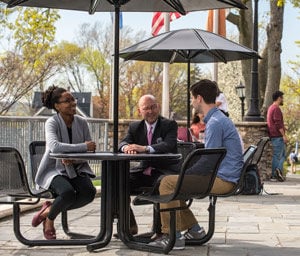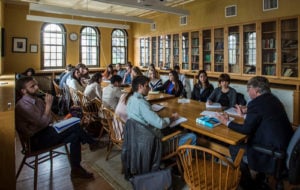2017 Graduate Education | International Affairs
THIS GUIDE IS NO LONGER ACTIVE. For the current FP Guide, click here.
The Fletcher School of Law and Diplomacy at Tufts University

Students chat with James Stavridis, dean of The Fletcher School.
In an increasingly complex world, The Fletcher School of Law and Diplomacy at Tufts University takes the traditional concept of global leadership one step further. Fletcher graduates are equipped to address the biggest social problems of our time across the sectors of government, business, and civil society, and are primed to be not just global leaders, but global tri-sector leaders.
“We look at the roles that civil society and business leaders must play, together with government,” says Alnoor Ebrahim, professor of management. “Our students are truly committed to finding new, innovative ways to address global social problems.”
In fact, students are drawn to Fletcher because the school offers them the opportunity to think across multiple disciplines and sectors, and recognizes that traditional boundaries for public sector and private sector companies and NGOs no longer work.
Ebrahim himself was drawn to Fletcher by the school’s focus on solving social problems in an integrated way, and its goal of finding solutions that combine profit motive with social benefit. In his own research, Ebrahim examines the challenges of impact measurement, accountability, and governance facing organizations with a social purpose.

“Our students are truly committed to finding new, innovative ways to address global social problems.” –Alnoor Ebrahim, Professor of Management, The Fletcher School
Ebrahim teaches courses on leadership, international business strategy, and managing NGOs and social enterprises. Students in his strategy course work in teams on global business opportunities, such as how to expand and grow a business like Apple in India, or how a social business like Grameen Bank might expand into the U.S.
The Fletcher School’s programs combine theory and practice. Students learn hard skills such as policy analysis, finance, trade law, and econometrics; soft skills such as negotiation, conflict resolution, leadership, and public communication; and cultural skills such as regional expertise and diplomatic history, coupled with proficiency in a second language.
 Fletcher students gain breadth of knowledge through coursework across the school’s three divisions: International Law and Organizations; Diplomacy, History and Politics; and Economics and International Business. Students also gain depth of knowledge in an area of interest by choosing one or two concentrations from 24 fields of study or a self-designed field.
Fletcher students gain breadth of knowledge through coursework across the school’s three divisions: International Law and Organizations; Diplomacy, History and Politics; and Economics and International Business. Students also gain depth of knowledge in an area of interest by choosing one or two concentrations from 24 fields of study or a self-designed field.
The Fletcher School’s largest degree program is the two-year Master of Arts in Law and Diplomacy (MALD), a traditional international affairs degree. The two-year Master of International Business (MIB) is a hybrid degree that combines a flexible international affairs curriculum with core business courses. Both the nine-month Master of Arts (MA) and the 12-month Global Master of Arts Program (GMAP) are designed for mid-career and senior professionals. The school also offers a Master of Laws in International Law (LLM) program for legal professionals, the Master of Arts in Humanitarian Assistance (MAHA), and the jointly awarded Master of Arts in Transatlantic Affairs (MATA) with the College of Europe. In addition, Fletcher offers offers a PhD in International Relations and a PhD in Economics.
Students and graduates also benefit from Fletcher’s loyal network of nearly 10,000 alumni. “The alumni network is a very strong, tightly knit community all over the world,” says Ebrahim. “It has been very helpful in terms of internships, research projects, and jobs for our students.”
Master’s Degrees offered: See Program Directory
Receive School Information: See Request Info
Contents
- 2017 Graduate Education | International Affairs
- Association of Professional Schools of International Affairs (APSIA)
- The George Washington University, Elliott School of International Affairs
- New York University School of Professional Studies (NYUSPS), Center for Global Affairs (CGA)
- UC San Diego, School of Global Policy and Strategy (GPS)
- Georgetown University, Walsh School of Foreign Service (SFS)
- The Fletcher School of Law and Diplomacy at Tufts University
- Yale University, Jackson Institute for Global Affairs
- Seton Hall University, School of Diplomacy and International Relations
- Penn State School of International Affairs
- The New School, Graduate Program in International Affairs
- Boston University, Frederick S. Pardee School of Global Studies
- University of Minnesota, Humphrey School of Public Affairs
- University of Denver, Josef Korbel School of International Studies
- Johns Hopkins University, School of Advanced International Studies (SAIS)
- SOAS University of London
- University of Kent, Brussels School of International Studies (BSIS)
- Fordham University, Graduate Program in International Political Economy and Development (IPED)
- The University of Texas at Austin, Lyndon B. Johnson School of Public Affairs
- Syracuse University, Maxwell School of Citizenship and Public Affairs